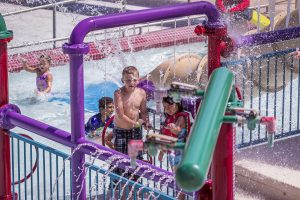 It happens in a matter of seconds and the consequences are heartrending. Tragically, it doesn’t have to happen at all. According to the Centers for Disease Control, outside of congenital anomalies, drowning is the leading cause of death among children 1-4. Twelve young children died in water related incidents in the Phoenix metro area in 2013. Last month, a West Chandler toddler became the latest victim. Keith Welch, battalion chief for the Chandler Fire Department, was not there when the child was pulled from a backyard pool near Chandler Boulevard and Rural Road in late May, but he’s been on plenty of drowning calls over the years. Welch emphasized the important role of strong barriers to pools — the city of Chandler requires them — but he also offered other tips to help prevent the unthinkable. “Always have an adult watching your children. And, really, it’s always good practice to have more than one person,” Welch said. Drownings sometimes occur in the context of family parties, when adults get busy socializing and may not be as vigilant. “The adults are out there, but are they watching the kids? We’ve all done it. I sit here and say I’m guilty too. So you need to have a specific water-watcher,” Welch said. The other bit of advice he offered was to make sure children know how to swim. Children in the 3- to 5- year-old range have a high likelihood of drowning, he said. But it’s not all about the kids. Adults drown, too. “You’d be surprised how many adults we get. For the adults it’s not always that they don’t know how to swim — it’s a medical emergency, especially in the elderly population,” Welch said. “Never swim alone. If you’re an adult and you have a medical emergency, you’ll need to have someone to help you.” Tips for reducing drowning:
It happens in a matter of seconds and the consequences are heartrending. Tragically, it doesn’t have to happen at all. According to the Centers for Disease Control, outside of congenital anomalies, drowning is the leading cause of death among children 1-4. Twelve young children died in water related incidents in the Phoenix metro area in 2013. Last month, a West Chandler toddler became the latest victim. Keith Welch, battalion chief for the Chandler Fire Department, was not there when the child was pulled from a backyard pool near Chandler Boulevard and Rural Road in late May, but he’s been on plenty of drowning calls over the years. Welch emphasized the important role of strong barriers to pools — the city of Chandler requires them — but he also offered other tips to help prevent the unthinkable. “Always have an adult watching your children. And, really, it’s always good practice to have more than one person,” Welch said. Drownings sometimes occur in the context of family parties, when adults get busy socializing and may not be as vigilant. “The adults are out there, but are they watching the kids? We’ve all done it. I sit here and say I’m guilty too. So you need to have a specific water-watcher,” Welch said. The other bit of advice he offered was to make sure children know how to swim. Children in the 3- to 5- year-old range have a high likelihood of drowning, he said. But it’s not all about the kids. Adults drown, too. “You’d be surprised how many adults we get. For the adults it’s not always that they don’t know how to swim — it’s a medical emergency, especially in the elderly population,” Welch said. “Never swim alone. If you’re an adult and you have a medical emergency, you’ll need to have someone to help you.” Tips for reducing drowning:
• Secure – Utilize and maintain an approved pool barrier such as a fence or net. Barriers are only effective if they are properly installed, utilized for their stated purpose, and regularly maintained.
• Supervise – Children should never be allowed in the vicinity of a pool or other waterway such as a lake, canal or irrigation ditch without constant adult supervision. A responsible adult should be in charge of maintaining a constant watch of pool at any time when a child or vulnerable adult is within the vicinity. Never allow children to supervise children.
• Train – Be prepared for the unthinkable and learn CPR. Tape a tag on the refrigerator or a kitchen cabinet with “911” in large letters and the phone number and address of the home. For more information on drowning prevention, contact Battalion Chief Keith Welch at 480-782-2170.

